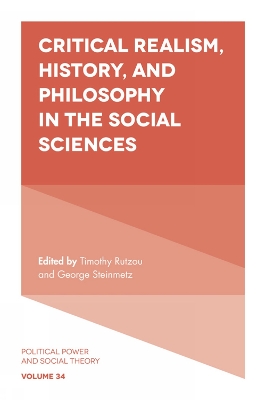Political Power and Social Theory
1 primary work
Book 34
Critical Realism, History, and Philosophy in the Social Sciences
Published 9 August 2018
Social science, history, and philosophy have often been neglect in thinking through their fundamentally intertwined relationship. The result is often an inattention to philosophy where social science and history is concerned, or a neglect of historicity and social analysis where philosophy is concerned. Meanwhile, the place of values in research is often uneasily passed over in silence. The inattention to, and loss of, the intersection between these different disciplines and their subject matters, leaves our investigations all the more impoverished as a result. In resolving these problems, it is not enough to strive for cooperation or integration, but to rethink of the nature of the disciplines themselves; their interests, purposes, and presuppositions.
In this volume, contributors explore different facets of these relationships, and move beyond the problematics erected by positivism often cast in terms of value-free or value-neutral science, that is, a science obsessed with empirical data, schematic classifications, and the pursuit of law-like forms. While positivism has been subject to critique, the influence and legacy of positivism remains. It remains in the way in which we often think about science; the line drawn between the sciences and the humanities; the norms researchers should follow; what a successful explanation looks like; and the ethical, normative, and political implications of scientific research.
Aimed at students and researchers of philosophy, history and the social sciences, this book is driven by a desire to revindicate questions concerning ontology and social ontology, to rethink the nature of explanation, and to resituate normativity and values within scientific, social scientific, and historical pursuits.
In this volume, contributors explore different facets of these relationships, and move beyond the problematics erected by positivism often cast in terms of value-free or value-neutral science, that is, a science obsessed with empirical data, schematic classifications, and the pursuit of law-like forms. While positivism has been subject to critique, the influence and legacy of positivism remains. It remains in the way in which we often think about science; the line drawn between the sciences and the humanities; the norms researchers should follow; what a successful explanation looks like; and the ethical, normative, and political implications of scientific research.
Aimed at students and researchers of philosophy, history and the social sciences, this book is driven by a desire to revindicate questions concerning ontology and social ontology, to rethink the nature of explanation, and to resituate normativity and values within scientific, social scientific, and historical pursuits.
